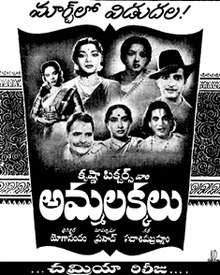Ammalakkalu
| Ammalakkalu | |
|---|---|
 Theatrical release poster | |
| Directed by |
D. Yoganand L. V. Prasad (supervision) |
| Produced by | Lena Chettiar |
| Written by |
Vempati Sadasivabrahmam (story / dialogues) |
| Screenplay by | D. Yoganand |
| Starring |
N. T. Rama Rao Padmini |
| Music by |
C. R. Subburaman Viswanathan–Ramamoorthy |
| Cinematography | Bomman Irani |
| Edited by | Nataraja Modaliyar |
Production company |
Krishna Pictures |
Release date |
|
| Country | India |
| Language | Telugu |
Ammalakkalu (English: Mothers & Sisters) is a 1953 Telugu drama film, produced by Lena Chettiar under the Krishna Pictures banner[1] and directed by D. Yoganand[2] in his directorial debut, while L. V. Prasad has taken care of supervision.[3] It stars N. T. Rama Rao and Padmini in the lead roles,[4] with music composed by C. R. Subburaman & Viswanathan–Ramamoorthy.[5] The film was simultaneously made in Tamil as Marumagal.[6]
Plot
Ammalakkalu means a few women in the neighborhood who peep into others houses and carry the information from one home to another to create misunderstandings for their enjoyment. The story begins with two friends Ramaiah (B. R. Panthulu) and Kistaiah (D. Balasubramanyam) who are farmers. Ramaiah’s family consists of his wife Sugunamma (Rushyendramani) and two sons Sundar (Amarnath), Kumar (N. T. Rama Rao) and a daughter Rupa (Surabhi Balasaraswathi), who are struggling for their daily needs. His relative tells him to start a small contract business in the town. Ramaiah discusses with Kistaiah regarding this matter, Kistaiah mortgages his wife’s jewelry and gives the money to Ramaiah. Ramaiah settles in the town, returns the debt and promises Kishtaiah that they will make his daughter Usha's (Padmini) marriage with his son Kumar. Ramaiah takes his sons to town for education. Meanwhile, these Ammalakkalu tell Usha that if her father also does business, she too can go to town for education. Kistaiah gets offended by these words. So he also starts to town and joins her in the same school. Years roll by, Kumar and Usha grow up and start loving each other. Sugunamma marries elder son Sundar to Shanta (Lalitha) a shrew. In the marriage, Sugunamma listens to the words of the Ammalakkalu, refuses to make Usha's marriage with Kumar and insults Kistaiah’s wife. Kistaiah became furious, leaves the venue and brings back Usha to the village. Usha and Kumar get a registered marriage with the help of friends. Kishtaiah calls the police to arrest Kumar, but they refuse, being this is a registered marriage. Ramaiah takes Kumar and Usha to his house. Usha lands up in the very difficult situation. Sugunamma and Shanta are very cold towards her. At this time, Kumar leaves abroad for higher studies and Usha faces a lot of torture in her in-law's house. The rest of the story how she gets rid of these problems and reunited the family.
Cast
- N. T. Rama Rao as Kumar
- Padmini as Usha
- Lalitha as Shanta
- Relangi as Riyo
- Amarnath as Sundar
- Dr. Sivaramakrishnaiah as Achchaiah
- B. R. Panthulu as Rammaiah
- D. Balasubramanyam as Kishtaiah
- Suryakantham as Seshamma
- Rushyendramani as Sugunamma
- Surabhi Kamalabai as Parvathi
- Surabhi Balasaraswathi as Rupa
Crew
- Art: Thota
- Choreography: Vempati
- Stills: Naad
- Story — Dialogues: Vempati Sadasivabrahmam
- Lyrics: Samudrala Jr
- Playback:
- Music: C. R. Subburaman, Viswanathan–Ramamoorthy
- Editing: Nataraja Moiliyar
- Cinematography: Bomman Irani
- Producer: Lena Chettiar
- Direction Supervision: L. V. Prasad
- Screenplay — Director: D. Yoganand
- Banner: Krishna Pictures
- Release Date: 12 March 1953
Soundtrack
| Ammalakkalu | |
|---|---|
| Film score by C. R. Subburaman Viswanathan–Ramamoorthy | |
| Released | 1953 |
| Genre | Soundtrack |
| Length | 34:06 |
| Producer |
C. R. Subburaman Viswanathan–Ramamoorthy |
Music composed by C. R. Subburaman & Viswanathan–Ramamoorthy. Lyrics were written by Samudrala Jr. Music released by Audio Company.
| S. No. | Song Title | Singers | length |
|---|---|---|---|
| 1 | "Kannemaavi Thotalona" | 2:45 | |
| 2 | "Neeve Naa Prema" | 2:27 | |
| 3 | "Undaloi Undaloi" | 11:10 | |
| 4 | "Kannemaavi Thotalona" (Sad) | 3:56 | |
| 5 | "Hurray Hurray" | 3:01 | |
| 6 | "Nee Kosam" | 1:48 | |
| 7 | "Penugonu Manasula" | 3:27 | |
| 8 | "Rupaa Rupante" | 2:18 | |
| 9 | "Jhan Jhan" | 0:26 | |
| 10 | "Maaradavela" | 3:48 |
References
- ↑ "Ammalakkalu Movie Cast". telugumoviepedia.com. Retrieved 2018-06-28.
- ↑ "Ammalakkalu (Director's Debut)". The Hindu.
- ↑ FilmiClub. "Ammalakkalu (1953)". FilmiClub. Retrieved 2018-06-28.
- ↑ "Ammalakkalu (1953)". gomolo.com. Retrieved 2018-06-28.
- ↑ "Ammalakkalu". KnowYourFilms. Retrieved 2018-06-28.
- ↑ "Ammalakkalu". Spicyonion.com. Retrieved 2018-06-28.
External links
Ammalakkalu on IMDb